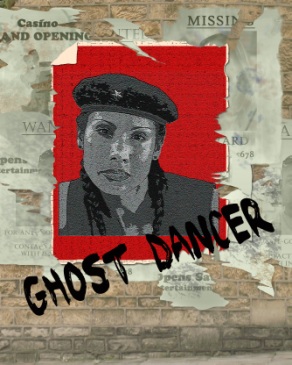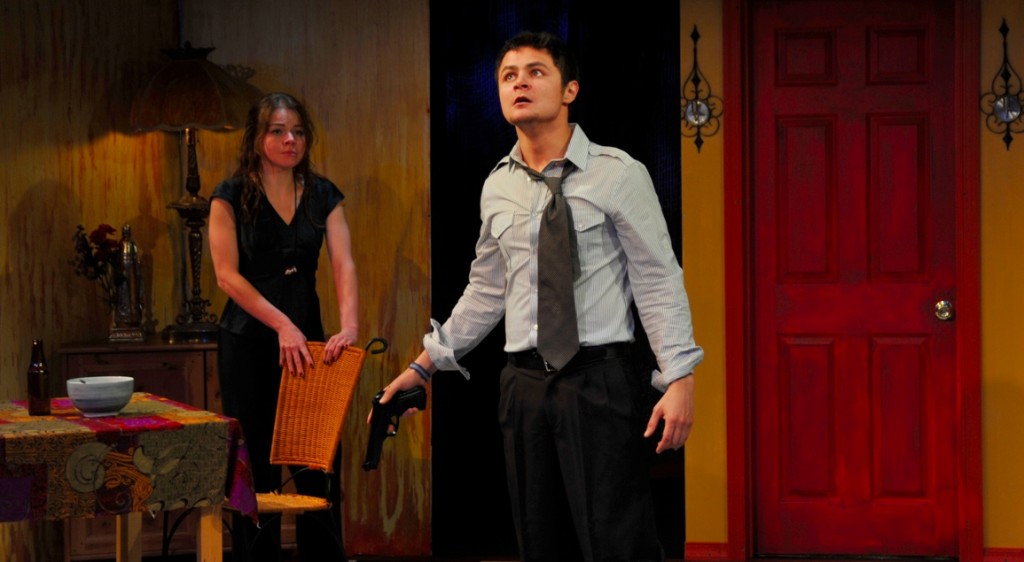– How can you listen to music when your country is falling apart?
- Because music is what keeps us together
– Ghost Dancer
Playwright Robert L. Hecker’s new politically-driven play, Ghost Dancer, unfolds in a hypothetical world set on a fictional Caribbean island. So, in this way, it is both everywhere and nowhere at once. In not being beholden to the history of any one oppressed people, it allows itself to speak for all oppressed people everywhere who rise up against persecution and iniquity. But the revolutionaries you will meet on this island, and specifically in the Romero household, are not peaceful protesters who sit mutely, arms locked in silent demonstration. The people of Ghost Dancer are the splinter groups who blow things up, who sacrifice for the cause … who put the needs of the many before the needs of the one. Some are born to this world, some are called to it; some have the spirit of revolution in their blood, some must suffer before they are brought to action. What Ghost Dancer shows is that these roles are not always pre-ordained.
Ghost Dancer‘s first moments explode with life – movements of exquisite celebration; Francisco (Luis Salgado) and Rosaria (Rosie Lani Fiedelman) dance around their friends’ apartment in a whirl of passion, fire, joy and heat — even as they are being told to bring more intensity to their dance. Several hours later, Ghost Dancer ends with a violent, driven, brutal dance set to pounding tribal beats which invoke the warrior spirits as Lakota (Lilia Vassileva) and Tony (Arturo Castro) are staring down death. Theirs is a dance of a completely different sort, but there is no doubt that it spills over with a profusion of their existence.
What plays out between the initial dance of life and the ultimate dance of death is a complicated journey for a family who will be tested by the bonds of loyalty, the need for justice, the cry for vengeance, the darkness of obsession and the anguish of bloodshed.
On this Caribbean island it seems that there are only two ways to live: either allow yourself to become a trained monkey by working at one of the casinos as a dealer (or, as Rosaria and Francisco hope to do, as dancers) and just allow the government to dictate policy … or stand up and fight to take back what is yours. Lakota is of the stand-up-and-fight variety, despite the fact that (or perhaps because of the fact that) she is actually not Latina at all but Native American. While Lakota’s heritage may be Indian she is imbued with the boiling rage of a native-born Latina, willfully demanding that her (in her estimation) passive husband, Tony Romero, to stand up and become the warrior she knows he can be. The warrior that is the son of the great man who fought for the cause and died for what he believed in.
Two children grew up in the shadow of a father and their family name. Tony had a father who stood for the people, a revolutionary fighting to change his country, Lakota had a father who stood against the people, and selling them out to a land of casinos and a departure from cultural values. Amid this combustion there rains down a constant fire of confusion and this causes Tony and Lakota to contantly question their marriage, their lives and their duty as citizens not only of their island but also of their world.
For his part Tony is doing his best to give his wife and new baby the best life he can. Having served a jail sentence he is now on probation and attempting to stay as clear of trouble as possible. Nights at the Romero house seem to consist of having the same fight over and over again; Lakota feeling maligned by her adopted community for not being Latin enough, and annoyed at her husband for not using his god-given blood to continue the revolution his father died for.
Living with the tenuous couple is Uncle Luis (Jorge Acosta) who is even more placid than his nephew; he has lived long enough to see his family die or be imprisoned. He is much happier being philosophical, turning to music, or to God, and shaking his head at his high-strung niece-in-law. Frequent visitor, Hector, (Leajato Amara Robinson) works with Tony down at the factory and commiserates with Luis about what is brewing just beneath the surface. Eventually, Hector is drawn into a dark plot involving a crate of guns and after a menacing knife-brandishing, which escalates into physical violence where he finds himself on the wrong end of the trouble that begins to spill over.
Eventually, Lakota — who can see no other way to sway her husband — commits the ultimate sacrifice and manages to turn Tony into not only a warrior and a leader. However, he is a leader whose new found passion for the cause, drives him to nonsensical actions, which have him at odds with his own party. By sabotaging their cause it leads him to be on the wrong side of an assassination plot.
With a strong overall cast and powerful performances delivered by Lilia Vassileva and Arturo Castro, there are moments when Ghost Dancer crackles with all the fire and energy necessary to carry the weight of a topic this heavy. There are times, however, when the script has heavy-handed tendencies with points being repeated more than necessary; the word “warrior” is spoken so much that it has the makings of a drinking game. We get early on that Lakota is the fire and Tony the one who wants to sit back — so while many of their conversations give context to their relationship and back-story — there are too many arguments that sound the same. Director Joshua A. Kashinsky does an excellent job in these moments, keeping the pacing lighteing fast. The rhythm is fierce and tempestuous so even as we cover the same ground there is no time to lose interest.
Several moments do feel weighted with an operatic-type melodrama. However the build is worth it, for the end is a culmination of a number of emotions that have been brewing throughout the piece, and the titular Ghost Dance brings a moment of sleek clarity, even as it is filled with drama and frenzy.
High praise for choreographer Amy Klewitz, who is brilliant at showcasing the fluid latin dance movements as well as the more deliberate Native American steps; and everything plays beautifully in Scenic Designer Duane Pagano’s beautiful set which cradles the action in an arbor of warm Caribbean atmosphere.
~~~
Ghost Dancer By Robert L. Heckler Directed by Joshua A. Kashinsky Theater Three at Mint Space 311 W. 43rd St. (at 8th Ave.) 3rd Floor New York, NY 10036 Click here for tickets.








{ 0 comments… add one now }